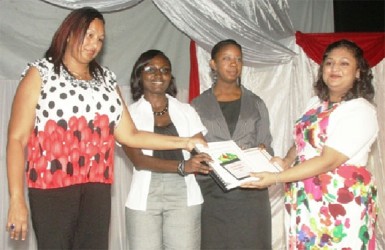The Ministry of Education is introducing the study of the Portuguese language to the curriculum for Grade 7 students in five high schools and says it is pushing for it to be an examinable subject at the CXC level.
The subject will be implemented at Queen’s College, Bishops’ High, St Stanislaus College, St Rose’s High and St Joseph High, a report from the Government Information Agency (GINA) said. A curriculum package that includes two work books for students (for in class and homework activities), and compact discs (CDs) to assist with pronunciation was designed by a team of curriculum developers. Teachers will be given curriculum guides for Grade 7, a hand book on basic Portuguese and “a textbook on everything Brazilian.” Plans are also in train to introduce Portu-guese at the Cyril Potter College of Education (CPCE) to teach local teachers the language.
Education Minister Priya Manickchand noted that while foreign languages have always been included on the schools’ curriculum and Spanish and French were being delivered, many of the rural schools had never had a foreign language teacher. The minister also said that the time had come to examine the relevance of Spanish and French being taught in the schools. In preparing the materials for the Portuguese syllabus, Manickchand said the data was not borrowed from any other country or book, rather it was tailored for relevance to the Guyana society.

“We have the brain, we have the mentality and we have the resources,” she said, adding that she was grateful to the teachers and other support personnel who assisted in preparing the curriculum. While language has never barred Guyana from enjoying relations with any nation, familiarity with the language and people of Brazil is expected to boost good relations. Manickchand noted that the delivery of Portuguese in schools has far reaching implications with regards to relations with Brazil, creating well-rounded students and getting a new subject into the Caribbean Examination Council (CXC) curriculum.
While Guyana and Brazil are still considering whether it may be best for the latter to send teachers to teach Portuguese here under conditions that allow for a successful programme, or vice-versa, the ministry had been in preliminary talks with the Caribbean Examination Council (CXC) to have Guyanese students examined by the Council.
“Guyana is pushing for Portuguese to be an examinable subject on the CXC curriculum, and we hope that we can do that within the next two to three years,” she said. This will entail the CXC Council preparing the curriculum, scheme of work and text books. As such, the minister urged students at the launching ceremony to give careful regard to the subject as they may be part of a pioneering group of students to sit Portuguese at the CSEC level.
“The Ministry of Education is at a great place right now…it’s at a place where much of the ground work has been done, much of the fundamental work to get our students to become global citizens has been done…there is still work to be done, but we have achieved and acquired so much,” she said. More students have enrolled and are attending school regularly at all levels and “we have the best exam results that we have ever gotten…we are not pleased at the Ministry of Education with some of the results so when we get 45 percent in English we try to determine how we are going to make this better.”
In giving an overview of the project, Deputy CEO – Development, Doodmattie Singh said preparation for the introduction of Portu-guese in schools started with some uncertainty and continued with much excitement.
“At the first meeting, the strongest asset for the project was discovered, and was that three of our own teachers – Candida Williams Head of Depart-ment, Modern Languages at Queen’s College; Dianne Blenman, Modern Language teacher also from Queen’s College and Malika Payne, Modern Languages teacher from the Bishops’ High School…and what was special about these three teachers they know Portu-guese and were willing to assist each other in the preparation of the curriculum,” she said. Other persons who assisted in the process included Head of the Curriculum Develop-ment Unit, National Centre for Educational Resource Development Sandra Persaud, former Principal of the Cyril Potter College of Education, Debra Thomas and Lecturer- at the Brazilian Embassy, Dr Meer Khan.









